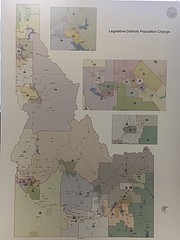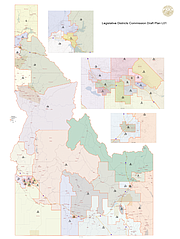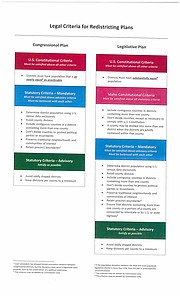Redistricting hearing draws heated public discussion
▶️ Listen to this article now.
SANDPOINT — The redistricting process will likely create a different split in Bonner County, according to the special commission charged with redrawing voter district lines.
Yesterday, the six-member bipartisan Commission for Reapportionment traveled to Sandpoint to collect public comment on the active redistricting process.
“What we want you to do is the sooner that you can help us with specific ideas, even maps you have of your own, it helps us,” chairman Bart Davis said in opening the meeting with an explanation of the process and rules the commission is required to follow.
“We wanted to at least put something in front of you for you to throw rocks at. And I have confidence that some of you might do that today.”
And throw rocks they did.
"We have to cut 5,000 people out of Bonner County and put them elsewhere. The question is, where do we cut 5,000 people out of the bottom of the county." said Rick Price during public comment.
Eighteen people including state Senator Jim Woodward and former legislator turned Dover mayoral candidate George Eskridge chose to speak during Wednesday’s meeting. The most frequently mentioned issues during public comment focused on removing the legislative split in Bonner County between Districts 1 and 7, and keeping elected officials in their current districts.
“This disenfranchisement of the Clark Fork area and the east side of Sagle has been a detriment to the people involved in the political process in Bonner County. It just has not been very beneficial,” said Eskridge about the current district lines.
“I appreciate the redistricting process,” said Tony McDermott during public comment, “but it has failed the people east of 95 and south of Lake Pend Oreille. We've reviewed your proposed solution to the problem. It won't make the people in Blanchard happy, but it would make the people in our area happy.”
McDermott explained his reason for providing input, stating that he was there representing 10 families that live around Garfield and Glengary bays.
Currently, the 1st legislative district contains all of Boundary County and a majority of Bonner County. The 1st district begins at the U.S.-Canada border and reaches to the southern border of Bonner County, with the exception of anything east of U.S. 95 after crossing the Long Bridge. That portion of the county is within the 7th district along with the entirety of Shoshone, Clearwater, and Idaho counties. A proposed split would eliminate that boundary, trading it for a split in the southwest portion of Bonner County. Residents south of Sagle and west of Lake Pend Oreille would be included in District 3, sharing representatives with a portion of Kootenai County.
Many of those who gave public opinion about the county split live in the 7th district, their public comments expressed feelings of disenfranchisement.
“On the extreme we've felt excommunicated, some others feel like they're in the ozone layer,” said Diana Dawson, a leader in the non-profit organization North Idaho Voter Services.
“Sagle is a part of the Sandpoint community. We participate in all of their community activities. It's not just difficult for the voters, it's difficult for the representatives.”
But there will have to be a split in Bonner County due to the population requirements for legislative districts.
Senator Jim Woodward lives in Sagle, and represents District 1 in the Idaho Legislature. If the county split between districts were to be redrawn, voters in Shoshone, Clearwater, and Idaho counties would lose Woodward as one of their representatives. Other elected officials were vaguely identified as being in a similar position.
“I find it a little dismaying that we would district out an incumbent legislator.” said Todd Engle about the redistricting boundary between District 1 and District 7.
Bart Davis responded to Engle’s comment,
"The one thing we have not done, we have never asked where any current incumbent lives. The statues say that we’re not supposed to consider where certain individuals live. We're going to draw the lines that best serve the people of that district, not the legislator that is serving that district.”
The commission is requesting members of the community to submit maps with boundary lines that make logical sense for the communities they are in. Lines can be drawn along any kind of barrier, including mountain ranges, streams, and roads.
“I suggest splitting a mountain range instead of using a road.” said Price.
A higher degree of public participation early in the redistricting process is hoped to result in better lines that uphold the law, and the spirit, of Idaho.
The commission is set with the task of redrawing two different kinds of voting district lines: congressional and legislative. Idaho has two congressional districts, each elects a representative that serves voters on the federal level in Washington D.C.. Legislative districts elect representatives on the state level who serve in Boise.
Both congressional and legislative lines must have an equal, or nearly equal population, and population data must be taken from the U.S. Census. There must be as few county splits as possible, and districts bigger than one county need to be made up of neighboring counties. Further guidelines dictate that the new district lines cannot be drawn to protect political parties or incumbents, multi-county districts must be connected by a highway or interstate, and oddly shaped districts ought to be avoided. Smaller statutory criteria advises against splitting neighborhoods, communities of interest, and precincts as much as possible.
The ideal population size for Idaho’s two congressional districts is 919,553 people. Currently, there are 35,000 more people in western District 1, when compared with eastern District 2, according to 2020 census data. Commissioners will have to increase the eastern district and decrease the western to make sure both have equal voting power.
Legislative districts need to have a population of 52,546 people each. The Idaho Supreme Court ruled that districts can have a 10% variation in population size, meaning that no district can have more than 5,246 extra people than the least populated district.
Once the commission creates a plan they believe satisfies the requirements, it goes through a legal review to make sure it follows both state and federal laws. Then the plan is submitted to the Idaho Supreme Court. The court can approve the plan, send it back to the commission to make changes, create a brand new commission to do the job, or the court can create and approve their own redistricting map.
To draw your own map using the same software that the commissioners use, go to legislature.idaho.gov/redistricting/2021/. The link to the software can be found under the “maps” tab.
The commission for Reapportionment is a six member bi-partisan committee appointed by key players in the Republican and Democrat parties. The Speaker of the House and the Senate President Pro-tempore each appoint a commissioner. The minority leaders of both the House and the Senate also appoint a commissioner. The last two spots are appointed by the chairmen of the Republican and Democrat parties.







